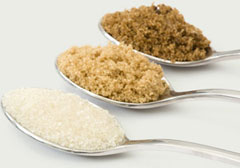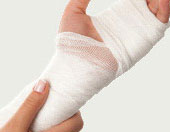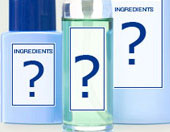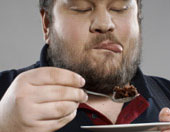
How to control sugar cravings
Posted in General Health articles on May 26, 2012. Last modified on March 04, 2020. Read disclaimer.
Sugar plays many roles in the American lifestyle: it gives us energy (albeit a short burst), can make us feel better emotionally (often followed by feelings of shame and guilt) and calms hunger (though it provides nothing in terms of beneficial nutrients).
Right from that first taste of mother's milk, many of us begin developing a lifelong "taste" for sweets. Packed with protein and carbohydrates, breast milk also contains a lot of sugar -- so it tastes extremely sweet. Some theories say humans are born with a sweet tooth.
Later, as young children, many of us get rewarded for good behavior (or bribed) with sweets and treats. This establishes an emotional connection between sweets, comfort and praise. To make matters worse, sugar acts like an endorphin to the brain, raising serotonin, creating pleasurable feelings and feeding an addiction.
Unfortunately, by the time we become teenagers and young adults, most of us are eating A LOT of sugar (table sugar and corn sweeteners). In fact, the average American consumed 93 pounds of added sweetener in the year 2000! This breaks out to be 32 teaspoons per day, far exceeding the USDA's recommendation of 10 teaspoons (which, by the way, is the amount contained in a single, 12 ounce soda). No wonder 68% of Americans are overweight or obese and weight and diet-related illnesses like diabetes, high cholesterol, high triglycerides and heart disease are becoming much more common.
Think you're doing better than average because you don't eat a lot of fast food, junk food, candies, and desserts or drink a lot of sodas (soft drinks account for 40% of US sugar consumption)? It may come as a surprise but sugar is commonly added to many of foods we might consider to be "wholesome", such as pizza, bread, canned vegetables and fruits, dried fruits, lunch meats, soups, salad dressing, fruit juices, ketchup, yogurt and iced tea.
+ Free Shipping & Returns on Eligible Items.
(*Amazon's Top 100 list updated hourly.)
A link between our emotions and a craving for sugar
- 75% of overeating (consuming more calories than our body needs) is caused by our emotions, social events and stress. Because food can have a calming, comforting or stimulating effect, many of us eat to feed our feelings rather than physical hunger! Unfortunately, emotional eating can result in obesity and other diseases, fatigue and feelings of guilt and shame.
- Chronic stress can trigger an increase in production of the hormone, cortisol. This not only triggers our appetite but it makes us crave foods that are high in carbohydrates. And the more "simple carbs" we eat, the higher our blood sugar levels -- which increases insulin production. Increased insulin levels send a signal to the body to store fat -- especially in the abdominal region which is the least healthy place to for us accumulate excess it.
- When we are exhausted from a lack of sleep, we not only have less energy and our appetite-suppression and weight-management hormones become disrupted, but we're also less capable of managing stress and our emotions.
What can we do to reduce our craving for sugar?
- When you are feeling overwhelmed, bored, or just get the urge to eat something sweet, raise your serotonin level by exercising. Take a walk, ride a bike, or head to the gym to replace the sugar endorphins. If exercise isn't possible, doing something else to turn your attention away from eating. (Make a list of things you can do to refocus your attention.)
- Reach for water rather than food. Drinking half your bodyweight in ounces of water each day will reduce your appetite and flush your body of unwanted toxins. (For instance, if you weigh 150 pounds, drink 75 ounces or 8 glasses of water daily.) Carrying a bottle of water with you with a measure can help you keep track your progress.
- Reach for fresh fruits, all-natural fruit desserts, popcorn or other snacks that provide you with nutrition and fiber. Many people find high-protein snacks like plain yogurt, cheese or nuts to be most satisfying.
- When you DO eat sweets or snacks, eat them in moderation -- that is, in small quantities and on occasion rather than daily. It is not the eating of sugars as a whole that are unhealthy. It is the quantities consumed.
- Rather than just automatically reaching for food when you have a craving, be mindful of what you are eating and how you are feeling. Don't eat sweets or snacks (or any food) as you are watching TV or working on the computer. When you consume anything, do so slowly, enjoy it and then stop. Jane Jakubczak, a registered dietitian at the University of Maryland, says that the payoff for emotional eaters drops off dramatically after the first few bites. After that, the costs from emotional eating are high but the rewards are minimal.
- Practice positive self-talk. If you slip up, don't scold or punish yourself; to do so may make your emotional state even worse. Instead, encourage yourself, just as you would a friend, to get back on track and keep moving toward success.
- Don't allow yourself to get too hungry! When we get too hungry, we are likely to eat too fast, too much and make less healthy choices.
- Eat healthy, meals that contain complex carbohydrates (whole grains). Complex carbs act like wood in a fire, producing sustained energy. Sugars and simple carbs, on the other hand, work like paper. They will deliver a burst of energy but it burns out quickly.
- Eat smaller meals but more frequently (5 or 6 times per day). Consuming healthy foods approximately every 4 hours will provide your body with constant energy so you are less likely to crave instant energy from sweets.
- Delicious meals are more satisfying. If you truly enjoy your regular meals, you may be less likely to "treat" yourself with sweets. So rather than just throwing something together for lunch, prepare or purchase something that is nutritious and delicious.
- Set small goals. Focus on making healthy choices for today. Remove temptations (keep sodas, sweets, snacks and any unhealthy foods out of the house, away from your desk, etc.), encourage friends and family to support you in your efforts, reward yourself for successes.
- When shopping, read labels. Ingredients are listed according to their amount. If a form of sweetener (sugar, corn-sweetener, honey, etc.,) appears as one of the first 5 ingredients, that food is likely to be high in added sugars.
- Get at least 7 hours of sound sleep every night. This will help you get recharged so you don't hit an energy slump.
- If you're feeling exhausted during the day, take a short nap rather than seeking a quick sugar boost. If you're tired at night, avoid late night snacking; go to bed.
- As with any addiction, as sugar becomes less significant in your life and is replaced with healthier habits and foods, our craving for sugar often subsides.
- Consider dark chocolate for a treat. Naturally processed, dark chocolate (70% cocoa or higher) is generally low in sugar while being rich in antioxidants. It may have the ability to release endorphins, provide energy and support heart health.
While human beings may like the taste of sugar, too much of any good thing is often not so good. Tame those sugar cravings and send the beast of obesity on the run. Your body will thank you.

 How happiness may improve health
How happiness may improve health Main causes and symptoms of dehydration
Main causes and symptoms of dehydration Preventing falls in the home
Preventing falls in the home Common health risks in cosmetics
Common health risks in cosmetics Avoiding stress and depression during the holidays
Avoiding stress and depression during the holidays Common causes of children's stomach aches
Common causes of children's stomach aches Tips for controlling sugar cravings
Tips for controlling sugar cravings